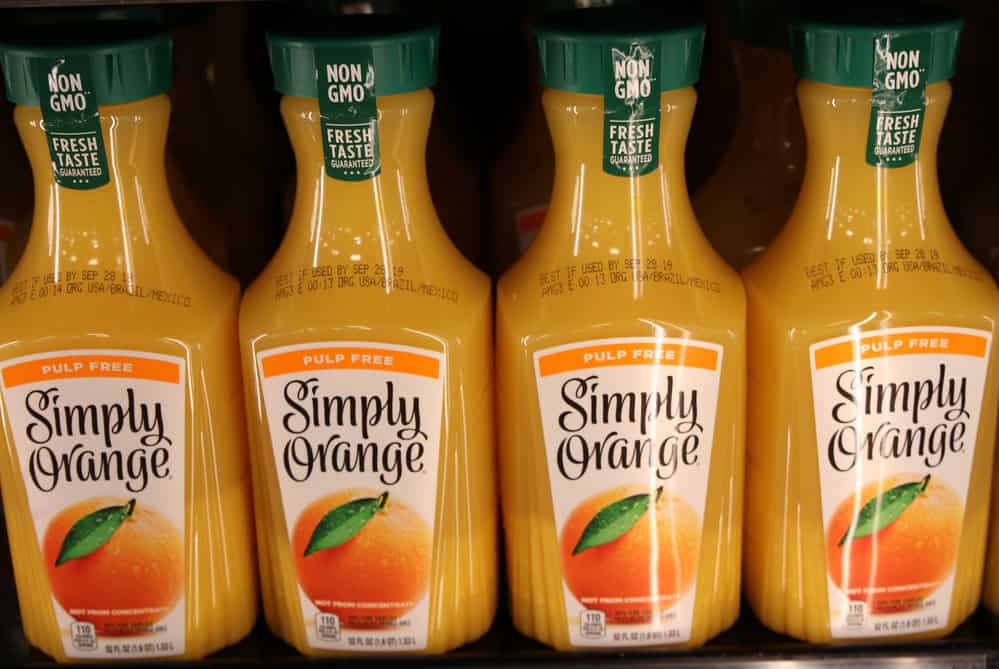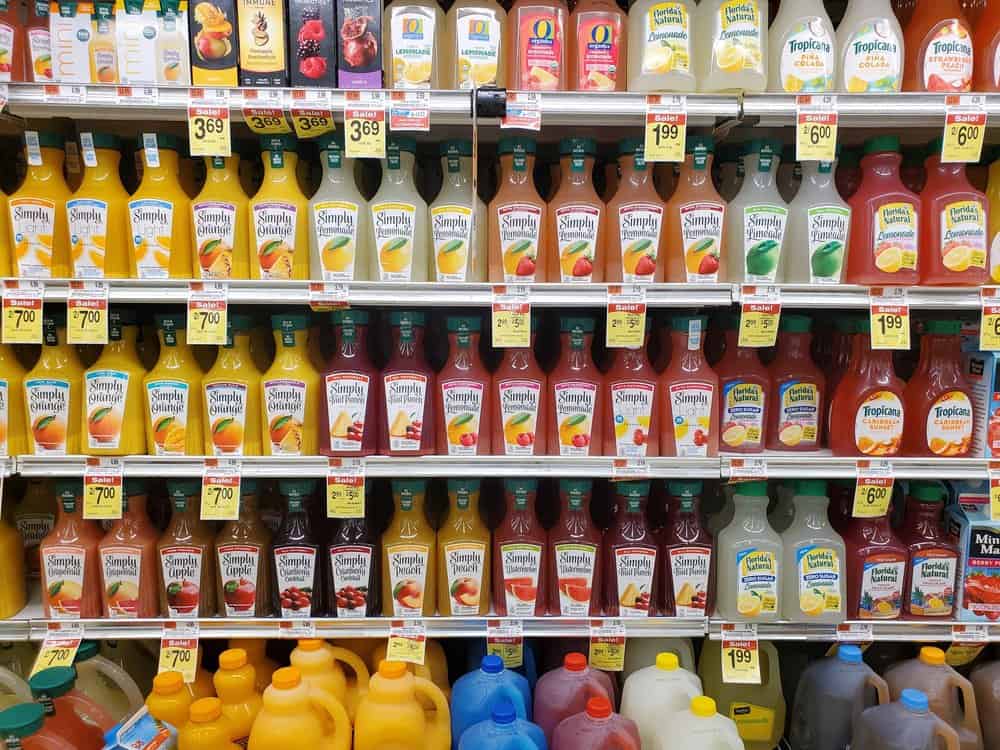Simply Orange Juice, a popular beverage under Coca-Cola’s umbrella, has recently been at the center of a legal storm. A class-action lawsuit has been filed against the company, alleging that its Simply Tropical fruit juice contains dangerously high levels of per- and polyfluoroalkyl substances (PFAS). These toxic PFAS chemicals, also known as “forever chemicals,” have been linked to various health concerns and environmental issues.
The Simply Orange PFAS lawsuit claims that the presence of these toxic chemicals in the Simply Tropical juice contradicts Coca-Cola (NYSE: KO) and Simply Orange Juice Company’s positioning of the product as “all-natural” and having “nothing to hide.”
This legal action comes as awareness of PFAS contamination in food products and drinking water sources gains traction, highlighting the importance of corporate responsibility and consumer rights concerning health and safety.
Simply Orange Juice PFAS Lawsuit
Recently, a class-action lawsuit has been filed against the Simply Orange Juice company and its parent company, Coca-Cola. This legal action centers around the alleged presence of PFAS, commonly known as “forever chemicals,” in their Simply Tropical juice product.
The plaintiffs in the lawsuit, filed in New York, claim that the presence of PFAS in Simply Tropical juice contradicts the companies’ positioning of the product as “all-natural” and having “nothing to hide.” These harmful chemicals, with their potential adverse effects on health, are a far cry from the healthy image portrayed by the beverage brand.
Interestingly, Simply Orange Juice is not the only company facing legal challenges related to PFAS. Numerous corporations, such as 3M Co., Chemguard Inc., Kidde-Fenwal Inc., National Foam Inc., and Dynax Corp., also receive a flood of PFAS lawsuits.
As the Simply Orange Juice PFAS lawsuit unfolds, it remains to be seen how the case will develop and its impact on the companies involved. However, one thing is clear: the presence and effects of PFAS in consumer products are becoming an increasingly significant issue, drawing the attention of both the public and legal spheres.
PFAS Forever Chemicals and Health Concerns
Simply Orange Juice is facing a lawsuit due to toxic PFAS chemicals in its products. These forever chemicals raise various alarming health concerns, ranging from cancer to immune system complications. This section delves into the health issues linked to PFAS exposure.
Health Issues Linked to PFAS Exposure
Cancer: Unfortunately, PFAS exposure has been linked to an increased risk of certain types of cancer, such as kidney and liver cancer. When it comes to our health, this is a red flag.
Immune system: Another worrisome aspect of PFAS is its negative impact on the immune system. These chemicals can weaken our body’s natural defenses, making us more susceptible to infections and putting our overall health in jeopardy.
Developmental issues in children: As if those concerns weren’t enough, PFAS exposure has also been associated with developmental effects or delays in children. This doesn’t bode well for future generations, as these chemicals may have long-lasting effects on our little ones.
Reproductive and fertility issues: PFAS chemicals aren’t exactly our friends in reproduction. Studies have revealed connections between PFAS exposure and fertility problems, making this another aspect of our health under potential attack.
Liver malfunction: Our livers play a crucial role in detoxifying our bodies, and unfortunately, PFAS exposure can compromise their functionality. A malfunctioning liver can lead to other health problems, which is certainly a cause for concern.
In summary, the presence of PFAS chemicals in products like Simply Orange Juice has sparked lawsuits and increased awareness of the health issues associated with these toxic chemicals. From cancer to immune system complications, the potential risks of PFAS exposure are not something to be taken lightly.
Environmental Impact
The presence of PFAS in Simply Tropical Juice raises concerns for consumer health and the environment. PFAS, known as “forever chemicals,” are a group of toxic substances that persist in the environment and bioaccumulate in wildlife and humans. Let’s delve into the different aspects of how PFAS contamination affects our surroundings.
Water sources like rivers, lakes, and groundwater are particularly vulnerable to contamination. PFAS can enter water systems through industrial discharge, landfills, and firefighting foams. Once in the water, these chemicals are incredibly difficult to remove, leading to potentially dangerous levels in drinking water. This, in turn, presents a risk to human health and the local ecosystems dependent on clean water.
Soil, on the other hand, can also be negatively impacted by PFAS. These compounds can seep into the ground, penetrating deeper layers and affecting plant growth. Contaminated soil may lead to reduced agricultural yields or the growth of crops that carry PFAS, leading to further exposure to these harmful substances.
Regarding wildlife, the persistence of PFAS renders them particularly troublesome. These chemicals can accumulate in the tissues of various organisms, from microscopic plankton to majestic eagles. Over time, high concentrations of PFAS in wildlife can result in debilitating health issues, reproductive challenges, and even death.
PFAS, unfortunately, don’t remain isolated to one area or ecosystem. As they accumulate in living organisms and are ingested through the food chain, the potential for harm multiplies. In essence, the presence of PFAS in Simply Tropical juice highlights a much broader environmental issue that demands further investigation and action to safeguard both human health and the health of our planet.
Company Involvement and Responsibility
Coca-Cola’s Stance
Coca-Cola, the parent company of Simply Orange Juice, finds itself in a sticky situation as they face a class-action lawsuit regarding the alleged presence of harmful PFAS in its Simply Tropical juice. The lawsuit accuses the company of misleading consumers with claims of an all-natural and healthy product, despite the discovery of this concerning chemical in their beverages.
While the lawsuit is ongoing, it remains essential to monitor Coca-Cola’s response to the allegations and its actions in addressing the issue. This will provide insight into their commitment to product quality and consumer safety.
Simply Orange Juice Company
The Simply Orange Juice Company prides itself on offering an “all-natural” and “nothing to hide” line of products. However, the recent allegations concerning PFAS in their Simply Tropical juice have questioned their reputation. Consequently, customers question the company’s quality claims’ validity and trustworthiness.
As a subsidiary of Coca-Cola, Simply Orange Juice Company must weigh in on the situation, ensuring their consumers remain dedicated to delivering top-quality products and addressing any potential issues with their current lineup.

Quality Claims
Harmful PFAS in Simply Tropical juice starkly contrasts the company’s “all-natural” and “nothing to hide” product positioning. This contradiction highlights the need for clearer quality claims and a thorough review of the manufacturing process by both Coca-Cola and the Simply Orange Juice Company. Their customers deserve a comprehensive understanding of the products they consume without any unsubstantiated or misleading claims.
To regain consumer trust, the companies involved should prioritize transparency, reveal the truth surrounding the allegations, and take necessary steps to rectify any confirmed inconsistencies in their product line. This will demonstrate a genuine commitment to product quality and customer satisfaction.
Simply Orange Packaging and Contamination
It’s disconcerting to find out that Simply Tropical juice, a product marketed as “all-natural” and “healthy,” has been alleged to contain high levels of toxic PFAS chemicals. But how did these chemicals end up in the juice in the first place? Well, it’s time to dig a little deeper to understand the role packaging plays in this scenario.
Undeniably, the packaging industry has come a long way in recent years, with a focus on reducing waste and using eco-friendly materials. However, there’s still room for improvement, specifically regarding the unintentional contamination of products. Plastic packaging materials can sometimes transfer incidental chemicals into the food or beverage they’re meant to protect.
You see, PFAS (per- and polyfluoroalkyl substances) are man-made chemicals that are primarily used in various products due to their heat and water-resistant properties. Regrettably, these chemicals have made their way into the packaging materials for some food and beverage products, which may lead to contamination.
In the case of Simply Tropical Juice, the PFAS chemicals found within the product may have been leached from the packaging itself. It’s a grim reality that these harmful chemicals can be insidious, creeping into an otherwise natural and wholesome juice.
“Weighing” the options, it’s essential to recognize that finding alternatives to PFAS in packaging materials should be a priority for the beverage industry. After all, with the knowledge that this toxic group of chemicals can cause harm to both human health and the environment, it’s critical to address the issue head-on.
Undoubtedly, the Simply Orange juice PFAS lawsuit highlights the need for better packaging materials and stricter regulations to prevent this contamination. So let’s hope this case becomes a catalyst for change, as future generations depend on a world where their food and beverages are free from harmful toxins.
Regulatory Authorities and Policies
Regarding the Simply Orange PFAS lawsuit, it’s crucial to understand the role of regulatory authorities and policies in managing chemical safety. In this section, we’ll explore the influence of the Environmental Protection Agency (EPA) and the standards regarding PFAS levels in consumer products.
Environmental Protection Agency (EPA)
The EPA is the primary federal entity responsible for safeguarding public health and the environment. As a dedicated guardian of our surroundings, it meticulously assesses the risks of potentially hazardous chemicals like PFAS. The agency’s role in the Simply Orange Juice lawsuit stems from its authority to set federal advisory limits on chemical levels in products meant for human consumption.
The EPA is constantly refining its understanding of PFAS and the risks they present. Doing so provides valuable guidance for industries, manufacturers, and consumers in navigating the complex landscape of chemical safety and regulation.
Simply Orange PFAS Levels
PFAS, or per- and polyfluoroalkyl substances, are a group of synthetic chemicals known for their exceptional durability and resistance to heat, water, and oil. Owing to these properties, they’ve been widely used in various industries, including food packaging and non-stick cookware. Though they have their benefits, certain types of PFAS have been linked to adverse health effects, raising concerns about their presence in everyday products.
Establishing safety standards for PFAS exposure is essential to ensure consumer safety. The EPA recommends drinking water health advisory levels for two specific PFAS chemicals: PFOA and PFOS. While these guidelines are not legally enforceable, they offer a valuable framework to protect consumers from potential risks. However, the current advisory levels for PFAS primarily focus on drinking water and not directly on food or beverages like Simply Orange Juice.
In summary, the Simply Orange Juice PFAS lawsuit highlights the significance of regulatory authorities and policies in managing chemical safety. The role of the EPA and the standards regarding PFAS levels in consumer products are essential aspects to consider to ensure public health and environmental protection.
Consumer Rights and Remedial Measures
Consumers have rights and remedial measures to consider regarding the Simply Orange Juice PFAS lawsuit. This section delves into the details of these rights and actions, specifically focusing on the class members and the potential for monetary compensation.
Class Members
Individuals affected by the Simply Orange Juice PFAS contamination might wonder if they can participate in the lawsuit. It’s essential to note that the primary plaintiff, Joseph Lurenz, seeks class-action status, aiming to represent others similarly affected by the alleged fraud, unjust enrichment, and violations of warranty and New York consumer laws.
Those who have purchased Simply Tropical Juice could be eligible to join as class members, but the class certification may still be pending. Keep an eye on the development of this case and consult with legal professionals if the lawsuit obtains class-action status and you wish to participate.
Monetary Compensation
As the lawsuit is still underway, any potential monetary compensation is yet to be determined. However, the litigation could result in compensation for class members if the court finds Simply Orange and its parent company, Coca-Cola, responsible for damages. These damages include the cost of the product and possible economic damages resulting from the alleged misrepresentation of the “all-natural” Simply Tropical Juice.
In conclusion, consumers who believe they have been affected by the PFAS content in Simply Orange Juice should stay informed about the lawsuit’s progress. Stay vigilant, gather any possible documentation related to your juice purchase, and consult with legal professionals to understand the possible implications and outcomes. Remember, you deserve accurate information about the products you consume and the right to fair compensation if those products have caused harm.
Impact on Health-Conscious Consumers
The recent Simply Orange Juice PFAS lawsuit has raised eyebrows among health-conscious consumers seeking all-natural and nutritious beverages. Discovering that Simply Tropical juice, a product under the Simply Orange brand, contains potentially toxic PFAS chemicals is quite disconcerting.
These consumers, who often seek products with simple ingredients for nutritional benefits, are betrayed by false advertising claims that Simply Orange is “all natural.” PFAS chemicals seriously call into question the Simply Orange products’ wholesomeness, safety, and nutritional integrity.
It’s important to note that PFAS, sometimes called “forever chemicals,” have been linked to negative health effects. These include reproductive and fertility issues, developmental effects or delays in children, an increased risk of certain cancers, and harm to the immune system. It’s worrisome, especially for those who gravitate towards all-natural labels and prioritize their health and well-being.
As a result, health-conscious consumers might find themselves reevaluating their choices regarding so-called all-natural products and be more skeptical of marketing claims promising nutrition and purity. Such skepticism might lead to a more thorough investigation of product labels, ingredient lists, and even sourcing practices as consumers seek to make well-informed decisions regarding their health and their families health.
The Simply Orange Juice PFAS lawsuit highlights the importance of transparency and honesty in the food and beverage industries, particularly for health-conscious consumers dedicated to maintaining a clean and nutritious lifestyle.
Future Implications and Precautions
The recent Simply Orange Juice PFAS lawsuit highlights the growing concern over the presence of synthetic chemicals, such as PFOA and PFOS, in consumer products. This development not only affects the company’s reputation but it also underscores the urgent need for regulatory bodies, such as the Food and Drug Administration (FDA), to implement stricter guidelines and precautions related to synthetic chemical testing in the food industry.
The consequences of the lawsuit may lead to changes in how companies like Coca-Cola handle their practices in manufacturing and labeling products. A heightened level of awareness among consumers can also create a demand for more transparent information about the presence of potentially harmful chemicals in everyday items. As a result, there may be increasing emphasis on ethical sourcing and sustainable practices, which could ultimately transform the industry.
In light of this situation, the FDA and other regulatory bodies must proactively address these concerns. For instance, they can work towards establishing standardized testing methodologies for detecting synthetic chemicals like PFAS in consumer products. Additionally, enforcing stricter New York consumer laws and similar regulations could help protect consumers from misleading marketing practices.
Meanwhile, customers should stay informed about the latest developments in this case and other similar issues related to synthetic chemicals in food products. One can keep track of announcements from the FDA or trusted health organizations and exercise caution in their purchasing decisions, opting for products that disclose ingredient sources and potential risks, if any.
By reacting appropriately to these concerns, it’s possible to inspire change within the industry and the regulatory landscape. Together, consumers, manufacturers, and authorities can contribute to fostering a safer, more transparent food industry, where health risks tied to synthetic chemicals become a thing of the past.
Frequently Asked Questions
What is the basis of the PFAS lawsuit against Simply Orange?
The PFAS lawsuit against Simply Orange stems from allegations that the company and Coca-Cola deceived customers by marketing their Simply Tropical fruit juice as an all-natural, healthy product when it was discovered to contain high levels of toxic PFAS chemicals. This apparent contradiction between the product’s claims and contents forms the legal action’s core.
Have there been any settlements in the Simply Orange juice PFAS lawsuit?
As of June 18, 2023, there hasn’t been any public information on settlements in the Simply Orange juice PFAS lawsuit. The lawsuit is ongoing, and new developments may arise in the future.
What health concerns are associated with PFAS in orange juice?
PFAS, also known as “forever chemicals,” have been linked to several adverse health effects such as hormonal disruptions, increased risk of cancer, and weakened immune systems. As consumers put their trust in products claiming to be natural and healthy, finding these contaminants can be alarming and concerning for their health and well-being.
How is the PFAS contamination affecting Simply Orange juice consumers?
The discovery of PFAS contamination in Simply Orange juice has led to consumer distrust and confusion. Many customers who consumed Simply Tropical for its purported health benefits and natural ingredients may now feel deceived and concerned about the potential health risks associated with the product.
Are there any alternatives to Simply Orange juice without PFAS concerns?
Yes, there are alternatives to Simply Orange juice. Still, it is essential to conduct thorough research and read labels carefully to ensure that the chosen products have been tested for PFAS and are transparent about their ingredients. Consumers should consider opting for products from manufacturers prioritizing safety, quality, and transparency regarding potential contaminants.
What is the current status of the Simply Orange PFAS lawsuit?
The Simply Orange PFAS lawsuit is ongoing, and new developments may occur soon. Interested parties should stay updated on any news or announcements regarding the lawsuit and its progress.



